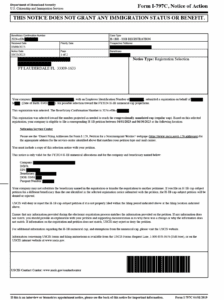Florida Judge Smacks Down Biden Stay Request
As I explained in my last post, on May 11, U.S. district court Judge T. Kent Wetherell II issued a temporary restraining order (TRO) blocking the Biden administration from releasing illegal migrants en masse under its slapdash “Parole with Conditions” plan — which was issued the day before. That sent the administration back to Judge Wetherell on May 12 seeking a stay of an order he issued in a different case on March 8, which vacated the government’s nearly identical “Parole+ATD” plan. He quickly smacked that request down, deeming it “borderline frivolous”, and calling into question many recent White House claims.
Florida I. In September 2021, the state of Florida filed suit in the U.S. District Court for the Northern District of Florida in a case captioned Florida v. U.S. (“Florida I”).
The state alleged in its complaint that the administration was deliberately “ignoring” a congressional mandate in section 235(b) of the Immigration and Nationality Act (INA) that requires DHS to detain migrants who have crossed the Southwest border illegally. That, the state alleged, caused it fiscal harm.
At the time Florida filed that complaint, the mechanics of how the administration was releasing tens of thousands of migrants per month were not clear. Congress, which was controlled by the president’s fellow Democrats at the time, wasn’t interested, and DHS didn’t care to explain.
Some masterful discovery efforts by Florida Attorney General Ashley Moody’s office, however, quickly filled in some of the blanks.
That discovery revealed that DHS was releasing migrants under two separate policies, one of which was official, the other not so much.
The official policy was the aforementioned “Parole+ATD”, that is, parole under section 212(d)(5)(A) of the INA with release on “alternatives to detention” (“ATD”, including “telephonic reporting, Global Positioning System (GPS) monitoring, and SmartLINK”) — none of which ensure migrants will ever appear for their hearings or removal.
Significantly, aliens were released on Parole+ATD without being issued Notices to Appear (NTAs), the charging documents in removal proceedings, or given court dates.
That left it up to ICE to thereafter find the (hundreds of thousands) of aliens released under the program and serve them with NTAs. That, as Judge Wetherell noted, only started the removal court process and thus created a massive backlog in cases that would “take decades to overcome”, and then only at a cost of tens of millions of dollars.
The ad hoc policy was “NTA/OR”, that is, release of aliens on their own recognizance (OR) after they were served with an NTA. If those migrants fail to appear at their removal proceedings, they are supposed to be removed (assuming ICE can locate them).
On March 8, Judge Wetherell issued an opinion in which he held that Parole+ATD was a “discrete” policy that violated the INA and the Administrative Procedure Act (“APA”, which governs executive-branch rulemaking), and on those grounds vacated it.
The court further held that the Biden administration has an “overarching Non-Detention Policy” (which includes NTA/OR releases), but it is not a “discrete agency action” subject to challenge under the APA — although, he was quick to add, if it were, it too “would be subject to vacatur because it contravenes the INA”.
Judge Wetherell stayed his order for seven days to allow the administration to appeal and seek a stay, but no appeal was filed until May 5 — 58 days after the court issued its order in Florida I and six days before Title 42 was slated to end. I will return to that appeal, below.
Florida II. Surreptitiously, the Biden administration thereafter created a new “discrete” release program, “Parole with Conditions”, laid out in a memo issued by Border Patrol Chief Raul Ortiz on May 10 but not publicly disclosed.
Parole with Conditions — which was not materially distinguishable from the Parole+ATD program vacated in Florida I — directed agents to engage in mass releases of apprehended migrants on parole without NTAs once one of three conditions were met: (1) Border Patrol’s processing facilities reached 125 percent of capacity; (2) agents apprehended more than 7,000 illegal entrants in a 72-hour period; or (3) Border Patrol was holding migrants for 60 hours or more.
Florida quickly challenged that new parole release policy, in a case captioned Florida v. Mayorkas. That case, which I will denominate as “Florida II” for the sake of simplicity and clarity, fortuitously was also assigned to Judge Wetherell for consideration.
The state argued in its complaint seeking a TRO in Florida II that Parole with Conditions — which had not been publicly disclosed at that point — “may violate” the vacatur in Florida I, “[b]ut it is unquestionably cynical, in bad faith, and contrary to both” the INA and the APA.
By the evening of May 11, the May 10 memo had been leaked, and Judge Wetherell was quick to grant the state’s request for a TRO, holding:
the challenged policy appears to be materially indistinguishable from the Parole+ATD policy vacated in [Florida I] — both in its purpose (reducing overcrowding at border patrol facilities) and manner of operation (releasing aliens into the country without first issuing a charging document placing them in immigration proceedings and simply directing the aliens to report to ICE within a specified period for further processing).
That TRO will remain in effect until May 25, six days after the court hears the state’s request for a preliminary injunction in Florida II on May 19.
Back to Florida I. Which brings me back to Florida I. On May 12, the day after its setback in Florida II, President Biden’s DOJ went back to Judge Wetherell asking for a stay of his both his March 8 order in Florida I and of his May 11 TRO in Florida II, arguing:
This Court’s vacatur and injunction irreparably harm the United States and the public by frustrating measures that are necessary to secure the border and protect the health and welfare of both migrants and Border Patrol Agents, in light of the significant increase in the number of noncitizens who have arrived and are expected to continue to arrive in the coming days. [DHS] has identified an exigent situation at the southwest border — record numbers of noncitizens seeking to enter or entering our country without authorization, overwhelming the immigration system — and has planned to use all authorities at its disposal to address these circumstances. But that authority is limited. DHS can no longer expel noncitizens arriving from other countries to Mexico under Title 42 and lacks the resources to detain this record number of arrivals, or the staffing and facilities to safely process and issue charging documents to all these new arrivals in the normal course.
Not that the Biden administration has had much use for “the normal course” up to this point.
In any event, the administration also asked the court to hurry up and rule on its requests for stays, advising Judge Wetherell that it planned “to seek emergency relief from the Eleventh Circuit by Monday, May 15, 2023, at 2:00 pm with respect to their requests to stay both orders if this Court does not grant the requested stays”.
From my experience, filing motions on a Friday and demanding quick service from the court is rarely a smart move, and it definitely wasn’t in this instance — when the “emergency” in question, the end of Title 42 — is an exigency the administration not only created, but also had more than 13 months to prepare for.
In his order denying the request for a stay in Florida I, issued the next day (May 13), Judge Wetherell noted at the outset in a footnote that Florida had filed its response, but that he did not plan to look at it until after he considered the government’s motion for a stay of his TRO in Florida II.
He explained: “the Court has already wasted more than half of this beautiful Saturday in Pensacola dealing with the motion in this case and it does not intend to waste the rest of Saturday (or Mother’s Day Sunday) dealing with the motion in” Florida II.
More saliently, however, Judge Wetherell held that no response from the state was necessary as the government’s motion in Florida I was “borderline frivolous”.
Critical to any request for a stay under federal caselaw is a showing that the movant would “be irreparably injured absent a stay”, but as Judge Wetherell noted: “DHS’s 65-day delay in seeking a stay [following his March 8 order in Florida I] undercuts any claim that it will be irreparably harmed absent a stay. That alone is enough to justify denying the ‘emergency’ stay request”.
In that vein, the court rebuffed the government’s argument that it would otherwise be barred from using Parole+ATD to respond to an expected rush of migrants, on two grounds. First, that the government had asserted that it planned to use Parole with Conditions to deal with that surge, and second:
DHS’s Chicken Little arguments about the impact of it not being able to (mis)use “parole” under either policy as a processing tool for the surge of aliens arriving at the border are hard to square with the DHS Secretary’s recent comments that only “a fraction of the people that we encounter” would be paroled into the country and that “the vast majority will be addressed in our border patrol facilities and our ICE detention facilities.” Either the Secretary was not being truthful (or maybe he was misquoted) or DHS’s inability to use “parole” as a processing pathway is not as big of a deal as Defendants are now making it.
The reference in question was to statements Mayorkas made at a May 10 press conference as reported by NBC News, but it should be noted that Judge Wetherell didn’t pull any punches when it came to the secretary, stating in a footnote:
Given what the evidence in this case showed about DHS’s excessive number of releases under the Parole+ATD policy that, on its face, said it was only to be used “sparingly,” … the Court expresses a healthy degree of skepticism about the veracity the Secretary’s comments.
Yet another showing that the government must make to secure a stay is that it is likely to prevail on appeal, which Judge Wetherell held that it failed to do. He continued:
Indeed, in the Court’s view, the merits on the Parole+ATD policy are not even close. … That statutory language [in the parole provision, section 212(d)(5) of the INA] does not in any way shape or form authorize “parole” to be used as it was in the Parole+ATD policy — i.e., as a “processing pathway” that facilitated the release of hundreds of thousands of aliens into the country without even initiating formal immigration proceedings merely for sake of administrative expediency.
“Sabotage, Pure and Simple”. Before I continue, it’s important to note that during her daily press conference on May 12, White House Press Secretary Karine Jean-Pierre was asked about the administration’s “backup plan” given Judge Wetherell’s order granting a TRO of the Parole with Conditions policy in Florida II.
She began her response by stating: “So let me just say on the ruling that you just you — just laid out to me: So, look, the way we see that — it’s sabotage. It’s pure and — and simple. That’s how that reads to us.”
There are certain things executive branch officials aren’t supposed to do; accusing federal judges of being “saboteurs” during publicly broadcast news conferences likely ranks at the top. Here’s how Judge Wetherell dealt with that statement in his May 13 order:
This ignorant (and dangerous) rhetoric ignores the fact that the evidence presented in this case showed that the “chaos” that the President recently acknowledged has been going on at the Southwest Border “for a number of years” is largely a problem of Defendants’ own making because they effectively incentivized the “irregular migration” that has been ongoing since early 2021 through the adoption and implementation of immigration policies that prioritized “alternatives to detention” over actual detention. … Moreover, if it is “sabotage” for a federal court to tell the federal government that it must comply with the law — or at least that it cannot misuse the limited parole authority provided by Congress — then so be it.
“Much Better than You All Expected”. When asked about the situation at the border during a Sunday bike ride in Rehoboth, Del., President Biden asserted that the situation there was “”Much better than you all expected”.
The New York Times parroted much the same line in its border reporting on May 12, describing the border as “crowded”, but “calm” and “not chaotic”.
There is much the American people aren’t being told about DHS’s continued border catch-and-release policies, but here’s a question: If things there are truly calm and copacetic, why did the administration rush to an already skeptical federal court judge claiming “record numbers of” migrants are “seeking to enter or entering our country without authorization, overwhelming the immigration system”?
The Biden administration’s either lying to Judge Wetherell or lying to us. And lying to a federal judge is a crime, carrying a felony sentence up to five years — so you decide.






